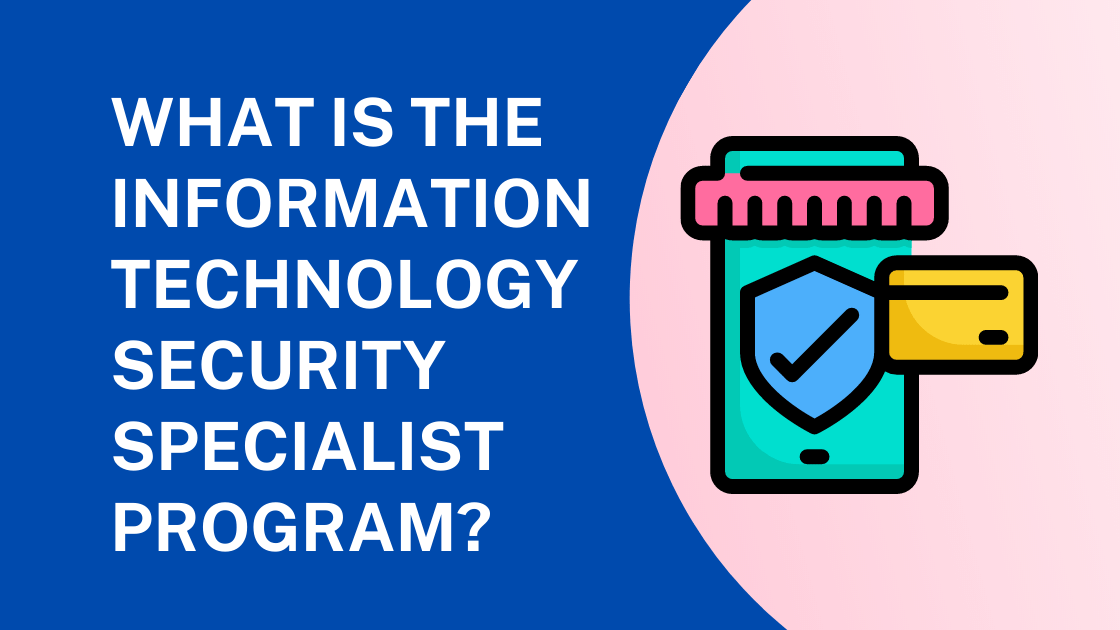A cyber security specialist (tech professional) understands cyber security technology, threats, and countermeasures to secure I.T. networks and systems.
This includes installing and configuring security software that prevents cyber-attacks, responding to cyber-attacks with appropriate countermeasures, and training employees on data security, monitoring, and breach protection.
Information security professionals are in high demand across all organizations, including schools, hospitals, government agencies, and medical practices.
According to the U.S. Bureau of Labor Statistics, the market for information security specialists will grow by 32% between 2018 and 2020, which is significantly higher than the average salary in other industries. Courses and certificates in information technology are available from accredited security specialist education institutions. Using the most up-to-date technologies and tools, you can land your dream job as an I.T. security specialist. Specialist in security
Job Description for an I.T. Security Specialist
Information security specialists are highly skilled and well-trained I.T. professionals. The department is in charge of planning and implementing security measures securing the Internet and monitoring security systems for breaches. These professionals are critical to a company’s ability to protect its data assets. Today’s businesses require secure information systems.
Companies are looking for information technology professionals as the number of cyber-attacks increases and become more sophisticated. Security experts are available to assist businesses in devising novel methods to prevent cybercriminals from gaining access to their valuable data.
I.T. is responsible for a wide range of tasks. Security professionals are constantly changing and becoming more complex. I.T. In addition, IT security experts determine the best ways to protect information within an enterprise.
On a typical day, I.T. Security experts are available:
- Putting in new security software
- T. (Information Technology) Monitoring I.T. permission testing is used to find flaws in information systems.
- Prepare reports on security breaches.
- Make security recommendations to the CEO, CIO, or other executives.
- Development of Information Technology Security requirements
- Staff training on cyber security procedures
I.T. Security Specialist Training
A security specialist is essentially an entry-level position in the world of cyber security. This means you have many options for getting started and then moving up to a management position. A career in information technology is a promising one. An I.T. Security specialist’s career path is promising, with numerous opportunities for advancement to executive positions.
You may not need a certification or a degree from a technical computer science college to begin your career. Your future employer’s job requirements determine this. You may advance your career if you have the necessary system security certifications. They are a great idea for someone brand new to I.T. and will provide you with some work experience while you work towards your goals.
ITSA (Information Technology Security and Administration), graduates, and other I.T. professionals are eligible for the Information Technology Security Specialist Program (ITSS). Professionals are seeking to expand their knowledge and credentials in information assurance, networking, and cyber security.
Here are some cyber security specialist certificate programs that allow you to earn six network administration and security certificates. Among these certifications are:
- CEH stands for Certified Ethical Hacker.
- CySA+ Cyber Security Analyst Certification
- Server+ is CompTIA’s entry-level security certification.
- CCNA MTA Networking/Network+ Cisco Certified Network Associate
This program will provide you with the knowledge and skills to understand basic hardware installation, maintenance, troubleshooting, topology support, and networking. In addition, you’ll be able to configure security and analyze information systems. You must have completed the ITSA program or equivalent training, experience, and certifications to qualify for the ITSS program. All of our programs provide lifetime Career Support and access to a diverse range of I.T. jobs and employers.
Skills Required to become an I.T. Security Specialist
- To get a job in I.T., you must have the necessary skills. Security professionals include:
- Programming languages such as C#, C++, Java, PHP, C#, and C++ are required.
- Firewalls, anti-virus, and anti-malware software are examples of computer security software.
- Capability to perform penetration tests
- Understanding of security information and event management (SIEM)
- Understanding the Packet Shaper and the Proxy Server
- Self-assurance in ethical hacking, coding techniques, and threat modeling.
- Working with Windows, Linux, and UNIX systems is a breeze.
I.T. skills are important for security specialists because they use software to improve cyber security.
- Soft skills are also essential for information security professionals.
- Discipline and concentration are required.
- Teamwork and collaboration
- Problem-solving creativity is required, as are excellent communication skills.
Analytical and organizational abilities are required
I.T. classes Fundamentals and ethics of information technology professionals, cloud computing security, project management, and database security are all skills you’ll need to succeed in the job market. After completing a comprehensive training course, future security professionals will explain complex I.T. concepts. I will be able to explain complex I.T. problems in layman’s terms to help colleagues understand best practices and assist managers in making decisions. Because senior I.T. Security specialists develop proposals and manage I.T. Teams, having project management experience helps employees advance to leadership positions.
It’s an excellent way to begin your career in information technology by becoming an information systems security specialist. Employer requirements can vary greatly, so you may miss out on opportunities to gain valuable work experience and knowledge before advancing to a managerial or senior position. It would help if you were prepared to learn about employers’ current needs as much as possible.










Leave a Reply